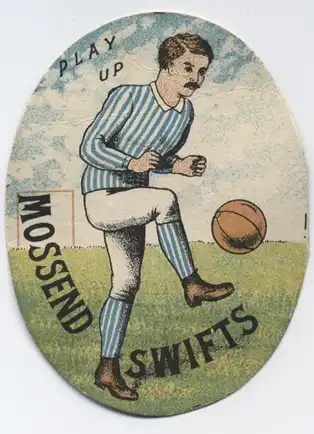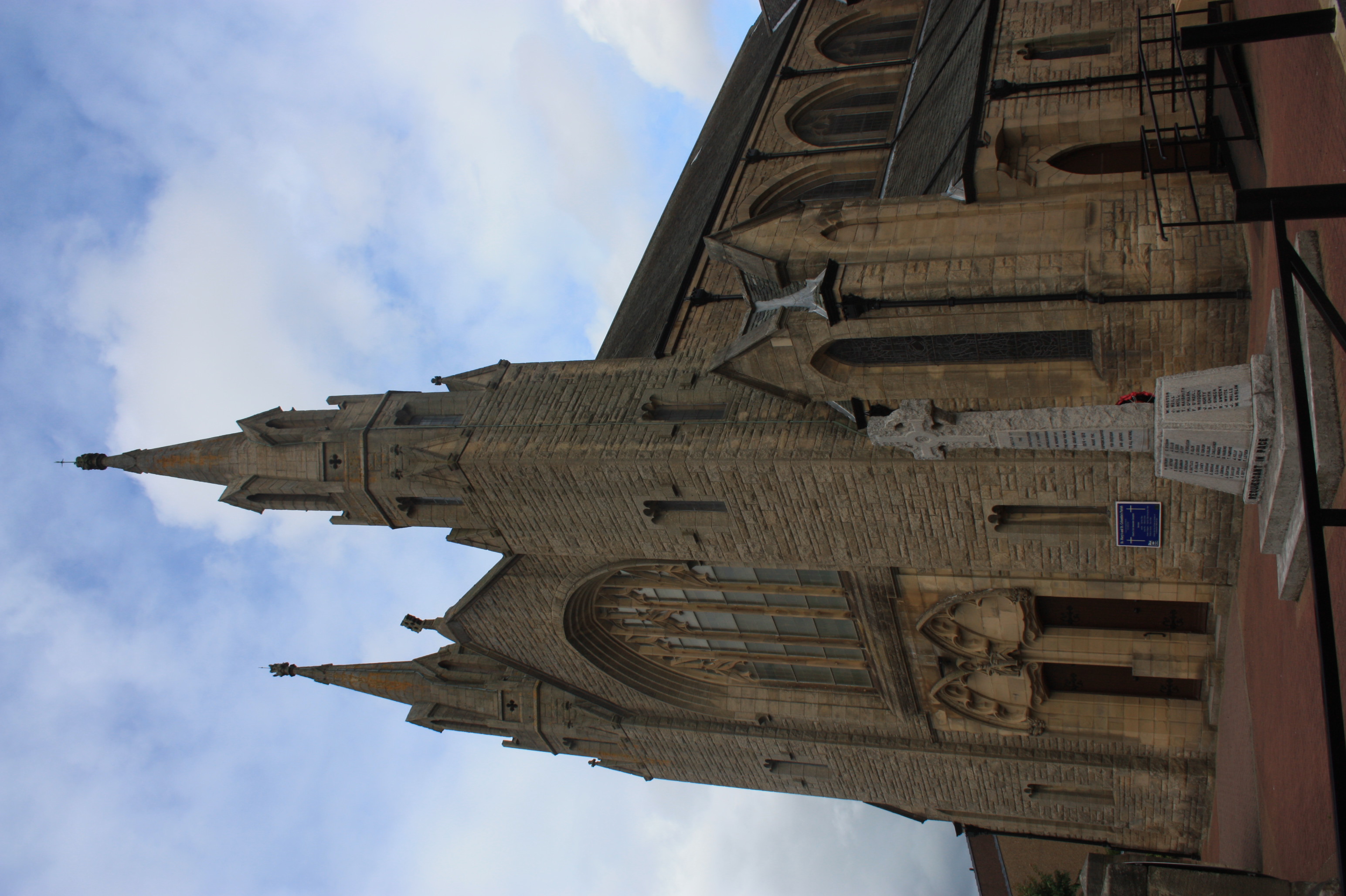|
Mossend Swifts F.C.
Mossend Swifts were a Scottish senior football club from the shale mining village of Mossend, West Lothian, Mossend, just to the north of the town of West Calder, West Lothian. There is now little left of this village (not to be confused with Mossend in North Lanarkshire – contiguous with Bellshill – which also had teams operating in the same era). History The club was founded in 1880. The Swifts won the first Linlithgowshire Cup - also known as Lord Rosebery's Cup - in 1884–85 unusual circumstances. In the semi-final, the Swifts beat Bathgate Rovers F.C., Durhamtown Rangers, who then protested on the basis that Mossend was not actually in Linlithgowshire, and so the club should not be allowed to enter. Mossend pointed out that it had been invited to join the association and paid its scrip; the Rangers produced a letter from Lord Rosebery setting out the terms of the competition, namely it was for clubs in the county only. The compromise was to let the Swifts complet ... [...More Info...] [...Related Items...] OR: [Wikipedia] [Google] [Baidu] |
King Cup (Scotland)
The King Cup is an association football cup competition for members of the East of Scotland Football Association in Scotland. The competition was founded in 1886. Format The competition is a knock-out tournament contested by the member clubs of the East of Scotland Football Association. Initial entrants * Adventurers * Bellstane Birds * Bonnyrigg Rose * Britannic Star * Broxburn Shamrock * Broxburn Thistle * Burntisland Thistle * Champfleurie * Cowdenbeath * Dunfermline Athletic * Glencairn * Grange Athletic * Leith Harp * Leith Thistle * Mossend Swifts * Oakbank Thistle * Polton Vale * Queensferry Hibernian * Sarsfield * Uphall Bluebell * Vale of Midlothian * West Calder History In 1886, the sportswear manufacturer and seller Percival King donated a cup to the Edinburgh Football Association. With no apparent use for it, a suggestion was made to form a competition for "semi-junior Edinburgh clubs", i.e. excluding Heart of Midlothian, Hibernian, St Bernards, t ... [...More Info...] [...Related Items...] OR: [Wikipedia] [Google] [Baidu] |
Rosebery Charity Cup
The Rosebery Charity Cup was a football competition organised for senior clubs from the East of Scotland. History The tournament was organised by and named for an early patron of Scottish football Archibald Primrose, 5th Earl of Rosebery and received continued support from his son, Harry Primrose, 6th Earl of Rosebery, after Archibald's death in 1929. A charitable competition, the chief beneficiaries of the funds it raised were the Edinburgh Royal Infirmary and the Leith Hospital. It was traditionally played as the last games of the season and ran from the 1882–83 season to the 1944–45 season. The trophy is on display in the Heart of Midlothian Museum. Rosebery Charity Cup Hearts Heritage, 28 May 2022 [...More Info...] [...Related Items...] OR: [Wikipedia] [Google] [Baidu] |
East Of Scotland Qualifying Cup
East or Orient is one of the four cardinal directions or points of the compass. It is the opposite direction from west and is the direction from which the Sun rises on the Earth. Etymology As in other languages, the word is formed from the fact that east is the direction where the Sun rises: ''east'' comes from Middle English ''est'', from Old English ''ēast'', which itself comes from the Proto-Germanic *''aus-to-'' or *''austra-'' "east, toward the sunrise", from Proto-Indo-European *aus- "to shine," or " dawn", cognate with Old High German ''*ōstar'' "to the east", Latin ''aurora'' 'dawn', and Greek ''ēōs'' 'dawn, east'. Examples of the same formation in other languages include Latin oriens 'east, sunrise' from orior 'to rise, to originate', Greek ανατολή anatolé 'east' from ἀνατέλλω 'to rise' and Hebrew מִזְרָח mizraḥ 'east' from זָרַח zaraḥ 'to rise, to shine'. '' Ēostre'', a Germanic goddess of dawn, might have been a perso ... [...More Info...] [...Related Items...] OR: [Wikipedia] [Google] [Baidu] |
West Calder Swifts F
West or Occident is one of the four cardinal directions or points of the compass. It is the opposite direction from east and is the direction in which the Sun sets on the Earth. Etymology The word "west" is a Germanic word passed into some Romance languages (''ouest'' in French, ''oest'' in Catalan, ''ovest'' in Italian, ''oeste'' in Spanish and Portuguese). As in other languages, the word formation stems from the fact that west is the direction of the setting sun in the evening: 'west' derives from the Indo-European root ''*wes'' reduced from ''*wes-pero'' 'evening, night', cognate with Ancient Greek ἕσπερος hesperos 'evening; evening star; western' and Latin vesper 'evening; west'. Examples of the same formation in other languages include Latin occidens 'west' from occidō 'to go down, to set' and Hebrew מַעֲרָב maarav 'west' from עֶרֶב erev 'evening'. Navigation To go west using a compass for navigation (in a place where magnetic north is the same dir ... [...More Info...] [...Related Items...] OR: [Wikipedia] [Google] [Baidu] |
Easter Road
Easter Road is a football stadium located in the Leith area of Edinburgh, Scotland, which is the home ground of Scottish Premiership club Hibernian (Hibs). The stadium currently has an all-seated capacity of , which makes it the fifth-largest football stadium in Scotland. Easter Road is also known by Hibs fans as "The Holy Ground" or "The Leith San Siro". The venue has also been used to stage international matches, Scottish League Cup semi-finals and was briefly the home ground of the Edinburgh professional rugby union team. Hibs first played at the present site of Easter Road in 1893. The ground holds the record attendance for a Scottish match outside Glasgow, when 65,860 attended an Edinburgh derby on 2 January 1950. The size of the terracing was greatly reduced in the 1980s. After the publication of the Taylor Report, Hibs considered leaving Easter Road and moving to a different site (Straiton, near Loanhead was mooted), but these plans were abandoned in 1994. Redevelop ... [...More Info...] [...Related Items...] OR: [Wikipedia] [Google] [Baidu] |
Tynecastle Park
Tynecastle Park is a football stadium in the Gorgie area of Edinburgh, which is the home ground of Scottish Professional Football League club Heart of Midlothian (Hearts). It has also hosted Scotland international matches, and been used as a neutral venue for Scottish Cup and Scottish League Cup semi-finals. Tynecastle has a seating capacity of , which makes it the sixth-largest football stadium in Scotland. Hearts have played at the present site of Tynecastle since 1886. History After Hearts was formed in 1874, the club played at sites in the Meadows, Powburn and Powderhall. Hearts first moved to the Gorgie area, in the west of Edinburgh, in 1881. This pitch, known as "Tynecastle Park" or "Old Tynecastle", stood on the site of the present-day Wardlaw Street and Wardlaw Terrace. As this site was then regarded as being 'out of town', Hearts would sometimes stage two matches for the price of one, or set an admission price much lower than Edinburgh derby rivals Hibs. In 188 ... [...More Info...] [...Related Items...] OR: [Wikipedia] [Google] [Baidu] |
Bathgate
Bathgate ( sco, Bathket or , gd, Both Chèit) is a town in West Lothian, Scotland, west of Livingston and adjacent to the M8 motorway. Nearby towns are Armadale, Blackburn, Linlithgow, Livingston, West Calder and Whitburn. Situated south of the ancient Neolithic burial site at Cairnpapple Hill, Bathgate and the surrounding area show signs of habitation since about 3500 BC and the world's oldest known reptile fossil has been found in the town. By the 12th century, Bathgate was a small settlement, with a church at Kirkton and a castle south of the present day town centre. Local mines were established in the 17th century but the town remained small in size until the coming of the industrial revolution. By the Victorian era, Bathgate grew in prominence as an industrial and mining centre, principally associated with the coal and shale oil industries. By the early 20th century, much of the mining and heavy industry around the town had ceased and the town developed manufacturin ... [...More Info...] [...Related Items...] OR: [Wikipedia] [Google] [Baidu] |
Polton Vale F
Polton is a village located in Lasswade parish, Midlothian, Scotland, anciently a superiority of the Ramsay family, cadets of Dalhousie. In 1618 David Ramsay of Polton was in possession. (See: ''Analecta Scotica'', Edinburgh, 1834). Notable residents * Thomas de Quincey the English writer, lived here in the latter part of his life, until his death in 1859. * Charles Thomas Clough an eminent geologist, lived at St Ann's Mount, Polton with his family See also *Polton railway station *Esk Valley Railway (Scotland) The Esk Valley Railway was a short branch line built to serve industry in the valley of the River North Esk, south of Edinburgh in Scotland. The terminus was Polton. The line opened on 15 April 1867 In the nineteenth century passenger use of the ... External links Vision of Britain - History of Polton in Midlothian Villages in Midlothian Bonnyrigg and Lasswade {{Midlothian-geo-stub ... [...More Info...] [...Related Items...] OR: [Wikipedia] [Google] [Baidu] |
West Calder F
West or Occident is one of the four cardinal directions or points of the compass. It is the opposite direction from east and is the direction in which the Sun sets on the Earth. Etymology The word "west" is a Germanic word passed into some Romance languages (''ouest'' in French, ''oest'' in Catalan, ''ovest'' in Italian, ''oeste'' in Spanish and Portuguese). As in other languages, the word formation stems from the fact that west is the direction of the setting sun in the evening: 'west' derives from the Indo-European root ''*wes'' reduced from ''*wes-pero'' 'evening, night', cognate with Ancient Greek ἕσπερος hesperos 'evening; evening star; western' and Latin vesper 'evening; west'. Examples of the same formation in other languages include Latin occidens 'west' from occidō 'to go down, to set' and Hebrew מַעֲרָב maarav 'west' from עֶרֶב erev 'evening'. Navigation To go west using a compass for navigation (in a place where magnetic north is the same dir ... [...More Info...] [...Related Items...] OR: [Wikipedia] [Google] [Baidu] |
Dumbarton F
Dumbarton (; also sco, Dumbairton; ) is a town in West Dunbartonshire, Scotland, on the north bank of the River Clyde where the River Leven flows into the Clyde estuary. In 2006, it had an estimated population of 19,990. Dumbarton was the capital of the ancient Kingdom of Strathclyde, and later the county town of Dunbartonshire. Dumbarton Castle, on top of Dumbarton Rock, dominates the area. Dumbarton was a Royal burgh between 1222 and 1975. Dumbarton emerged from the 19th century as a centre for shipbuilding, glassmaking, and whisky production. However these industries have since declined, and Dumbarton today is increasingly a commuter town for Glasgow east-southeast of it. Dumbarton F.C. is the local football club. Dumbarton is home to BBC Scotland's drama studio. History Dumbarton history goes back at least as far as the Iron Age and probably much earlier. It has been suggested that in Roman times Dumbarton was the "place of importance" named as Alauna in Ptolemy's his ... [...More Info...] [...Related Items...] OR: [Wikipedia] [Google] [Baidu] |



